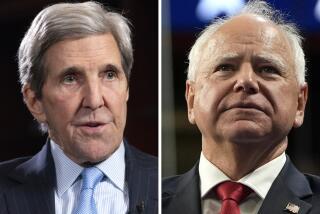Cold War Reprise
- Share via
The Republican Party is challenging the Democrats to go back and fight the Cold War all over again during the 1988 presidential campaign. Just how much the Democratic candidate, Michael S. Dukakis, knows about defense will be revealed in large part by how well he avoids the challenge.
Campaigning on defense issues is a no-win proposition because candidates have time only to mention weapon systems, not to discuss where they fit into overall policy. The mentions of MX missiles and “Star Wars” defenses against Soviet nuclear missiles are two current examples.
Polls show again and again that voters believe, in about equal parts, that Washington should neither trust the Soviet Union any farther than it could throw it nor get into a fighting war with the other superpower. By margins on the order of 98 to 2, voters also refuse to wade through the details of how to achieve the two goals so that speech writers and briefers tend to abandon defense issues to cliches and body language.
Thus Vice President George Bush warns that Dukakis would “give away the store,” and Dukakis sends his own signal that he is for a nuclear freeze, or whatever is the next best thing. Even readers of detail cannot glean much from such posturing, and such exchanges are worse than useless as foundations for defense policy.
In another example, Bush complained recently that Dukakis lacks the vision of the late John F. Kennedy, but fails to identify which Kennedy. Was it the one who campaigned in 1960 on a “missile gap” that turned out to be heavily in favor of the United States? Or was it the Kennedy who created the federal arms-control agency and set in motion the first agreement to curb nuclear-weapons tests?
Surely Bush could not be trying to call attention to the fact that Kennedy’s campaign promises forced him into major production of new intercontinental ballistic missiles--a move that the Soviets then tried to match at full throttle.
One of the most subtle defense issues involves the match-up between the troops, tanks and tactical aircraft of the North Atlantic Treaty Organization in the West and the Warsaw Pact in the East. There is fundamental disagreement over whether either could overwhelm the other, as well as whether other NATO countries contribute their fair share to the defense forces of the West. There is no way to campaign on the issue because there is no right side and no wrong side.
Even contrasting the experience of the candidates in foreign affairs without supporting detail is of no value to voters. Bush clearly has experience and Dukakis has none. But among Bush’s exploits was importing a team of hard-liners during his hitch as director of central intelligence, which led to revised estimates of the Soviet defense buildup that shaped policy for nearly 10 years before CIA analysts recognized that they were exaggerated.
As an issue, defense has been bringing out the worst in candidates for a long time. Former President Dwight D. Eisenhower promised in his first campaign to go beyond containing the Soviets to rolling them back from regions that they dominated at the end of World War II. He left office persuaded that a nuclear-arms race was futile.
Jimmy Carter promised to cut defense spending and actually buried some defense programs, including the B-1 bomber, but before he left office he had started increases in the defense budget that President Reagan just needed to keep going.
What defense posture will work best for the United States over the next 10 years or so depends in part on how the Soviet Union fares in its effort to keep its economy from falling apart. Eastern Europe, pecking its way through the shell of Soviet communism that has kept it docile since World War II, is a factor. In four years Western Europe may become a single economic entity big enough to challenge the United States for leadership.
These and other changes cry out for the most sweeping evaluation of America’s defense policies since 1945, including careful evaluations of the role of nuclear weapons and the question of whether what the West needs is a defense against the Soviets in Europe or against Third World fanatics in the rest of the world.
It is too bad the candidates cannot just promise to do the best they can and let the issue go at that.
More to Read
Get the L.A. Times Politics newsletter
Deeply reported insights into legislation, politics and policy from Sacramento, Washington and beyond. In your inbox twice per week.
You may occasionally receive promotional content from the Los Angeles Times.










